
When Jon Morrow launched his new personal development blog, Unstoppable.me, at the end of 2016 he reached out to a few successful bloggers to share his first post.
Jon credits Steven Aitchison’s Facebook fans for the massive amount of clicks and shares that put that first post over the viral edge — 16,000 in three days.
“Without question, Steven is a Facebook master,” Jon said.
“Steven shared the post on his Facebook page twice, and both times Unstoppable got a massive boost in clicks and shares. His Facebook community really helped the post go viral.”
Unfortunately, few bloggers recognize and cultivate the hidden power and reach of a popular Facebook page and active community like the one Steven has built. Instead they blindly accept and follow misguided myths perpetuated by those who haven’t taken the time to study how Facebook works.
From Humble Beginnings Grew a Powerhouse
Steven admits he certainly didn’t pay much attention to Facebook during the first few years of his blog, Change Your Thoughts, Change Your Life, that he started in August 2006. After getting good feedback from readers, he started to get more serious about turning the blog into a business in 2009, when he had about 2,000 email subscribers.
By the time he quit his job as an addiction counselor in September 2012 to devote himself to blogging, his email list had grown to 10,000 subscribers, but he says his Facebook presence was “kind of non-existent.”
“I had maybe 30,000 likes from slow, incremental growth from posting to Facebook from my blog, typical of most bloggers,” Steven said. “I literally wasn’t doing anything.” He made $36,000 the following year from full-time blogging, more than he had made up to this point but not enough to support his family.
Then Steven began focusing on and experimenting with Facebook. And everything changed.
10X Business Growth from Facebook
Fast forward to 2017.
Steven transformed his blog and Facebook page in the last five years from an average page he described as “going nowhere” to the moneymaker it is today with more than 3.6 million likes and more than 3.6 million uber-engaged fans.
His email list is a healthy 71,000 subscribers. His business grossed $360,000 in 2016 and is on track for a substantial boost in 2017.
The One Question That Transformed Aitchison’s Facebook Page
Steven credits one fundamental shift in his thinking and attitude for his Facebook page’s transformation from okay to extraordinary.
“I had been asking myself, ‘How do I make more money?’” Steven said. “Then I started asking myself ‘How can I help more people?’” Without realizing it, that simple, six-word question launched his evolution from a money-centered entrepreneur to a heart-centered entrepreneur, and with it, his financial future.
“You’ve got to think about the viewer first, and you’ve got to think about what is going to touch somebody’s heart, what’s going to give them an emotional response,” Steven explained. “If you can, think about it from that point of view. Always think about the customer first. It’s not about what you want.”
That unassuming question is the catalyst behind all of Steven’s growth over the last five years. His financial success is proof that persistence, experimentation and smart marketing can combine with a generous heart and people-first approach to build a business.
“By asking that one question,” Steven said, “I think that alone keeps you grounded because you’re always thinking about the readers, not always thinking about you, the business and the money. I really found my purpose when I started asking that question.”
After realizing that putting people first enriched — not diminished — his bottom line, Steven’s naturally curious mind began questioning other common myths about making money online and on Facebook.
The Two Misguided Myths That Keep Facebook Pages Stuck in Mediocrity
Steven’s popular and profitable Facebook page busts the two prevalent myths about making money on Facebook, and it’s a key element of what he shares with the community of bloggers in his membership course, Your Digital Formula.
Myth #1: You Can’t Make Money on Facebook
This myth is rooted in the mistaken belief that the feel-good focus popular on Facebook can’t be used as a monetary tool.
Steven’s Facebook page is unapologetically feel-good. He loads it with self-styled encouraging and inspirational quotes and videos (more on this tactic later). His success proves that this approach can be profitable.
From its meager beginning of $36,000 in 2012, Steven’s business grossed $360,000 in 2016, and he attributes $200,000 of the revenue to Google AdSense from the massive traffic driven by Facebook to his blog. As his Facebook likes and followers grow, so does his Facebook-driven income stream.
Myth #2: You Have to Advertise on Facebook to Make Money
In his determination to master Facebook, Steven tested and wasted $50,000 on paid Facebook advertising before he knew what he was doing with no profit to show for it.
“The myth is that you have to advertise to make any money on Facebook, and you don’t. You absolutely don’t. It takes a wee bit longer, but you can totally do it all organically,” Steven said. “I built up the Facebook page organically.”
The danger of this myth is compounded by the faulty notion that emotion has no value or currency. Steven believes touching hearts is a powerful advertising message that can have viral legs.
The point where everything changed was when he realized he could rely on connection and emotion to drive his business, instead of focusing solely on money.
The 6 Big Mistakes That Doom Facebook Pages
Central to Steven’s powerful Facebook strategy is studying and modeling what works. He’s seen six big mistakes repeated over and over, one of which can doom even well-organized Facebook campaigns.
Mistake #1: Posting Only What You Like Without Considering Whether it Touches or Helps People
Because all kinds of content goes viral on Facebook at one time or another, many people assume that any clever thought they have is fair game to go viral. Yet nothing could be further from the truth, Steven says. If you truly want to grow a massive following on your Facebook page, you have to focus on content that touches hearts and helps people.
Stop and ask yourself if the image, quote, blog post or video really connected with you, really touched your heart, he advises. Get beyond your own personal likes, biases and preferences and down to the emotional value of the content. If you find yourself in resistance saying, “But I really like it!” you may not be focused closely enough on your readers.
Mistake #2: Assuming Your Followers Will Like Anything You Post Because You’re You
This second mistake is a deeper version of the first mistake, which assumes that your followers will like anything you post just because you posted it. It’s actually quite easy to correct these two mistakes with one blow: Think about your audience first. Post helpful, touching content they have demonstrated they like, Steven advises.
”I think Facebook page owners are always thinking they can put anything up because they’ve got a million followers and their followers are going to like everything. I think that’s one of the big mistakes, thinking anything you put up is going to be okay for them, whether it be a blog post, a video or an image quote.
“You’ve got to be thinking and asking the questions, ‘Okay, does this entertain somebody? Does it enlighten somebody, or does it educate them in some way?’ If you ask yourself those questions, then I think you can’t really go far wrong depending on the page type and niche.”
Mistake #3: Giving Everything You Post on Facebook Equal Treatment
Let’s face it: Some content will be more popular on Facebook. Millions of dollars are spent trying to figure out that magic formula, but Steven has learned — and leverages — a simple Facebook truth: People share content that touches their emotions.
“Facebook page owners will drag out posts, posts that are good, posts that are bad,” Steven said. “If you put a lot of bad blog posts up — bad as in people are not going to interact with the content and it’s not creating that connection for some reason — those posts are not going to give you a lot of reach because the only way you’re going to get traffic from Facebook is if you create that engagement, and part of that engagement is commenting, liking and sharing.”
If you share your blog post on Facebook, and people comment, like and share from the outset, then that blog post is going to do well, and you will get a lot of traffic. You should give that post more Facebook love than the ones that get no reaction. (More on this later.)
Mistake #4: Fear of Testing, Fear of Touching People
The most effective way to determine the best type of content for your audience is to test different types and record the response, yet people hesitate and procrastinate because of two very human fears — looking stupid and feeling vulnerable.
Steven said one of the most dramatic changes he made with his Facebook page was to be in constant testing mode, trying out varied types of content — different styles and images for quotes, different types of videos, along with different types of questions inviting responses.
Once he let go of those fears and intentionally reached out to touch people’s emotions, Steven said the viral doors opened almost spontaneously.
“A lot of people are afraid to put up a test. This is all I do. I just kind of test,” he explained. “I say that to all the students as well: ‘You have to test.’
“They ask me, ‘Do you think this will work?’ I say, ‘I don’t know, test it. Just test it and see what happens.’ A lot of people are afraid to do that, to try something new.”
Mistake #5: Thinking Facebook Is Neutral to the Type of Content You Post
This fourth mistake (a corollary to the previous one) is thinking Facebook has no preferences about the type of content posted. Au contraire!
Right now Facebook is quite partial to video content because it has a stated goal of overtaking YouTube within a year, Steven said. That means videos of any kind are given preferential exposure and automatically ranked higher than standard text posts.
Notice more video in your feed? That’s why, and it’s only going to get more intense.
Mistake #6: Ignoring Other Facebook Pages in Your Space
Rather than treat other Facebook pages as competitors, Steven treats them as collaborators and strategically shares their content with his blog readers and Facebook followers.
He developed a nifty tactic of writing blog posts that highlight specific genres of Facebook pages and their Facebook headers, such as “25 of the Top Consciousness Raising Facebook Pages,” then sharing them with the Facebook pages he featured in the blog post.
The showcased Facebook page owners almost always reciprocate by sharing the post on their own pages, sending more visitors to Steven’s Facebook page and creating a win-win situation for everyone, Steven said. He also watches the most popular pages in his niche to see what they’re doing and what he might try.
Steven’s well-honed strategy combines both a heart-focused attitude and savvy marketing tactics.
8 Steps to Attracting Millions of Facebook Fans
Step #1: Shift Your Focus from Making Money to Helping People
Make that fundamental shift and everything else aligns with it.
Since first asking himself that question back in 2012, helping more people has driven every question Steven asks about his strategy, tactics, products and content creation.
”Think about the kind of people on your page, what their main pain points are and what other issues they’re having,” Steven said. “If you can touch somebody’s heart, then it speaks to them and you’ve got the potential to go viral.”
Step #2: Know Your Audience Better Than You Know Yourself
Most Facebook page owners don’t really know the demographics and psychographics of their readers and, as a result, don’t know who they are talking to. Yet Facebook gives in-depth data on your audience and their preferences within your Insights page. Aitchison’s readership is about 76% women aged between 25 and 54.
“When I am writing or doing video and putting blog posts up, I always have them in mind,” he said. “You can’t put up blog posts about how fantastic men are. You can, obviously, but it’s not going to do as well as if you have a different type of blog post about how fantastic women are, for a silly example.”
Step #3: Don’t Stop at Posting Heartfelt Content — Interact with Your Readers
Steven intuitively follows a two-part content-creation sequence: establishing an emotional connection with readers with content that touches his own heart, and interacting with followers directly.
He makes sure the quotes and images he posts are heartfelt by asking himself if they touch his own emotions and connect with his readers on a deep emotional level. He follows through by being accessible and responding to readers directly. It’s this last step Aitchison feels is the critical piece of the puzzle that most bloggers ignore.
“I think what’s made the page explode is that I’ve really interacted,” Steven said. “Most page owners, when they do Facebook, they put some post up, they put many posts up, but they’re not really connecting with the readers.”
“Readers come back for more when they know they’ve got access to the Facebook page owner, who’ll respond to comments when you’re on Facebook Live, or shout out their name or respond to messages,” he said. He only got someone to help behind the scenes with automatic responses earlier this year.
He believes it’s about creating something readers can belong to and connecting with them with your posts, quotes and videos. “It’s about connecting to something and to somebody as well,” Steven said.
Step #4: Write Your Own “Aha” Quotes that Touch People
Aitchison is a firm believer that quotes can deliver “Aha!” moments that readers remember. When he started actively working his Facebook page, Steven was using quotes from other writers for his image quotes, just like everyone else.
Then he realized he was giving away free marketing, often to dead people, when he himself had written millions of words. So he began to rewrite the thoughts and concepts in his own words, putting his name below the quote. His online and Facebook recognition accelerated from 20 people finding his blog every month by Googling his name to 1,200 people.
“It first started when I was doing the image quotes. Then it kind of transferred over onto video and now onto the live shows as well,” he said. This tactic is an easy and obvious way of becoming your own brand that leads directly to more traffic, more likes and, eventually, more income.
Step #5: Create Video That Touches People
Aitchison’s entry into video was pure experimentation that triggered a social media epiphany.
He was in his hotel room one night while at a conference in San Diego in 2016 when he decided to try Facebook Live, which had been recently introduced.
“I thought, I’m going to try this and see what happens. I didn’t have anything planned to say or anything. Just went on and just said, ‘Hi, Steven Aitchison here doing a Change Your Thoughts page.’ Then before I knew it there were about 10,000 people on at one time. I’m going, ‘Holy sh–. What’s going on?’”
By the time Steven had finished his first short video, it had about 50,000 total views. He realized there was a huge opportunity to interact with his millions of followers and immediately launched a daily Facebook Live show.
He mixes up his content by playing off his blog posts while talking with readers, doing interviews with people popular in the self-development niche, hosting live and guided meditations and sharing other personal development videos with commentary.
He urges bloggers to face the fear and do it anyway.
“Tech things can happen, but there have been no really awkward moments.”
10 Things to drop from your life right now.
10 Things to drop from your life right now…<3
Posted by StevenAitchison on Monday, November 6, 2017
Step #6: Study Your Posts’ Performance and Promote the Winners
Here’s a statistic that shocks most Facebook page owners, who think 100% of their followers see everything they post. In reality, only about 6% of your Facebook page followers will be shown a post when you first post it, as Facebook tests its popularity.
If your post is shared and commented upon — becoming more popular — Facebook will show your post to more of your followers, but not until it’s sure the post is popular enough according to its algorithm. Popularity breeds popularity in the Facebook algorithm. If your post sits around and does nothing at first, Facebook won’t show it to more of your followers.
Pay attention to the organic winners, give them a boost and let them run, Steven advises. Ignore the losers, which will drag down the overall ranking of your page. Learn from both the winners and the losers, and model the winners.
That’s difficult for most bloggers who believe the problem is that not enough people have seen the post, not that it doesn’t touch people.
Steven tracks the popularity of all of his Facebook posts and reposts the most popular content — the posts that rank higher than his average ranking — every three to four weeks. When the reach and engagement of those popular posts drops below average, he retires them for a few weeks or months, then starts reposting them again since his page will have a new set of followers who haven’t seen that post yet.
He credits this one technique — reposting the winners — with dramatically growing his Facebook page, as repostings often did better than the first posting.
Step #7: Pay Attention to Facebook’s Next Moves
Steven always has one eye on what Facebook is pushing and will shift gears at a moment’s notice.
“You have to experiment and look out for what Facebook is pushing,” he advised. “I call it the Facebook stack. The Facebook stack is really all about checking out what Facebook is really pushing just now, and right now, for example, it’s videos. It’s Facebook Live just now and their own creation, which is Facebook Slideshow. They’re going to give it more reach because Facebook is promoting that automatically.”
Rather than turn a blind eye to the advertising on Facebook, Steven recommends paying attention to what Facebook itself is advertising — a hidden-in-plain-sight clue to what Facebook is pushing at the moment. And be ready to act.
“You have to jump on the bandwagon,” Steven said. “You have to be on the ball and look out for what Facebook is promoting. You have to jump on it. People kind of get stuck thinking Facebook is going to stay the same and you can put the same old kind of blog posts up, and they don’t realize Facebook is changing almost every day.”
Step #8: Always Be Human and Genuine
Despite millions of followers and Facebook Likes, Aitchison said because of the type of person he is, his head is never in the clouds.
“I always question myself, I always question what I’m doing and I always ask the question, ‘How can I help more people?’” If you ask that one question in every area of your business you’ll quickly feel the disconnection when you don’t ask it, Steven said.
“The biggest compliment I keep getting is, ‘You’re really genuine, you’re really authentic,’ and I think that just being yourself really comes across.”
Lessons Learned: What Steven Would Do if He Had to Start Over
Steven was quick to list the things he would do differently if he had to start his blog and business over today.
Actively build my email list from Day 1.
Steven didn’t focus on building his list actively from the start, letting the list grow slowly and organically. Later, when he saw the direct correlation between how increased traffic on Facebook sent to an opt-in page exploded his email list and business, he realized the late start had held him back.
Understand that it is the interplay of your blog, email list and Facebook where you make money
Steven approached these elements in sequence, focusing first on his blog, then email list growth, then Facebook page growth. It wasn’t until he integrated these three key elements that his business growth took off. All three would be integrated immediately if he had to do it over.
Connect with people and collaborate sooner
Steven said he was like many bloggers, doing his own thing as a lone wolf for the first six to seven years. Not only did that mean he learned some things more slowly as he struggled, it meant he didn’t have the advantages of a network that would support and help him.
Understand the focus is on how many people I can connect with and help, not only on making money
Without the focus on helping people, Aitchison believes even a masterful execution of the first three lessons will result in mediocre success.
More Growth Means More People to Connect With and Touch
Steven doesn’t expect that his Facebook page will look the same in a year or two. Nor will his blog or business, except that he’ll be connecting with more people and touching more hearts. He understands that change is the only constant, and he fully intends to roll with Facebook’s direction.
He anticipates his page will evolve as livestreaming becomes more of a focus on Facebook, likely requiring him to upgrade the quality of his live shows to more TV-like quality, in effect creating mini TV shows.
“I think it’s going to be about me getting in front of the camera more,” Steven predicted. “Not something I’m naturally inclined to do, but this is why I’ve been doing Facebook Live for some time now — to get out there, to connect even more with the audience. I see it growing bigger, obviously, along with the challenges.”
He relishes the challenges because they keep him connected to the readers, and it’s that connection that keeps him going.
“I’ll never get big-headed or conceited because I always bring myself back to earth as quickly as I put my head in the clouds,” Steven said. “It’s a nice feeling when people come to you and say, ‘You really changed my life.’
“And I keep on asking the question, ’That’s nice, but the balance is, how can I help more people?’”
source https://smartblogger.com/facebook-likes/

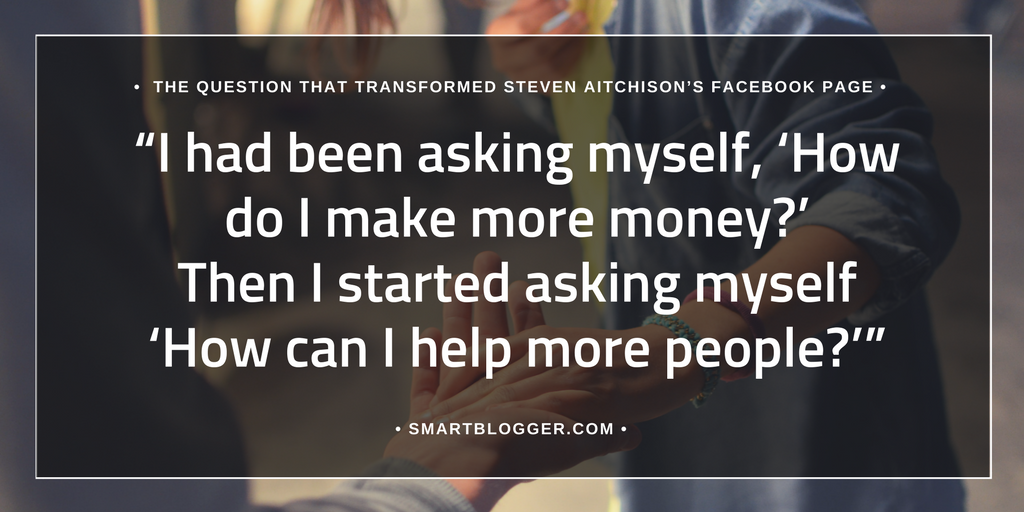
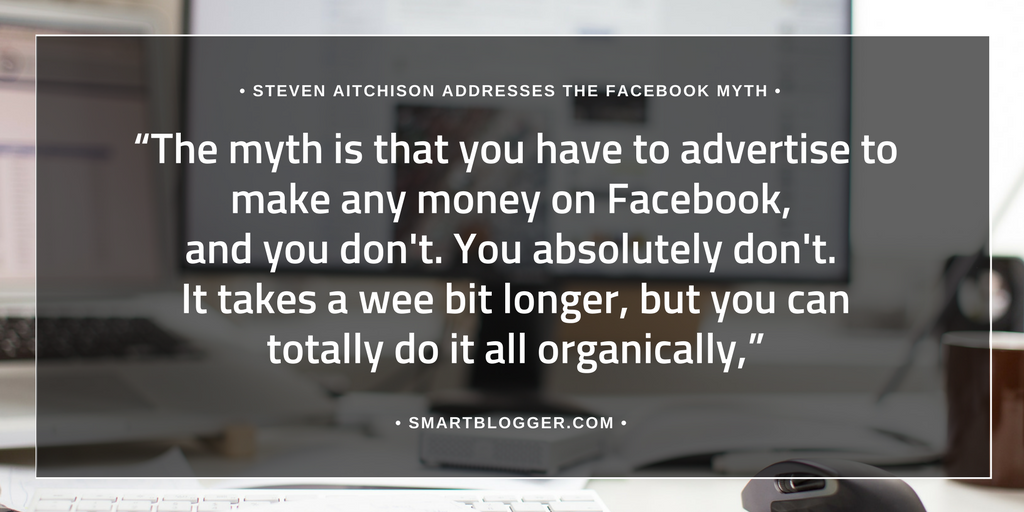
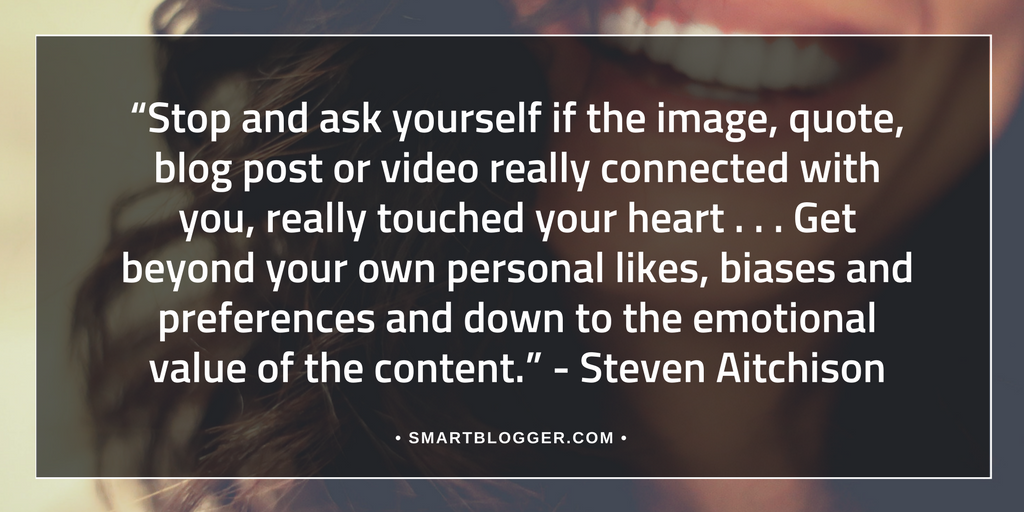
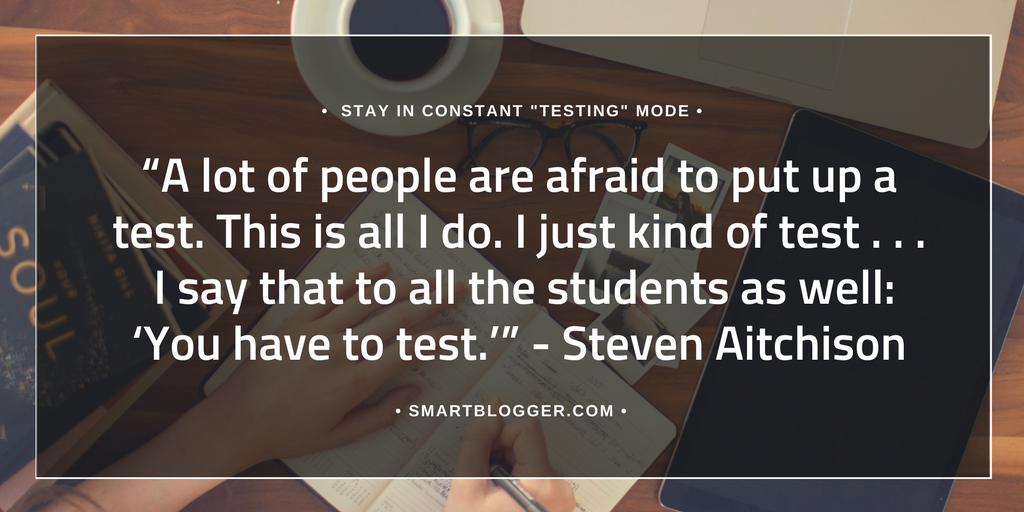
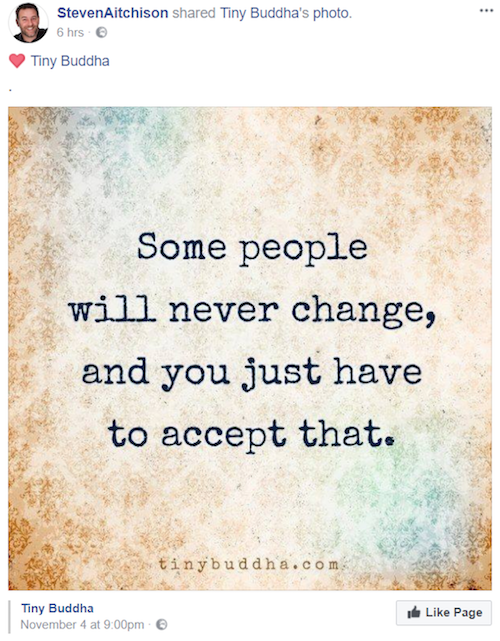
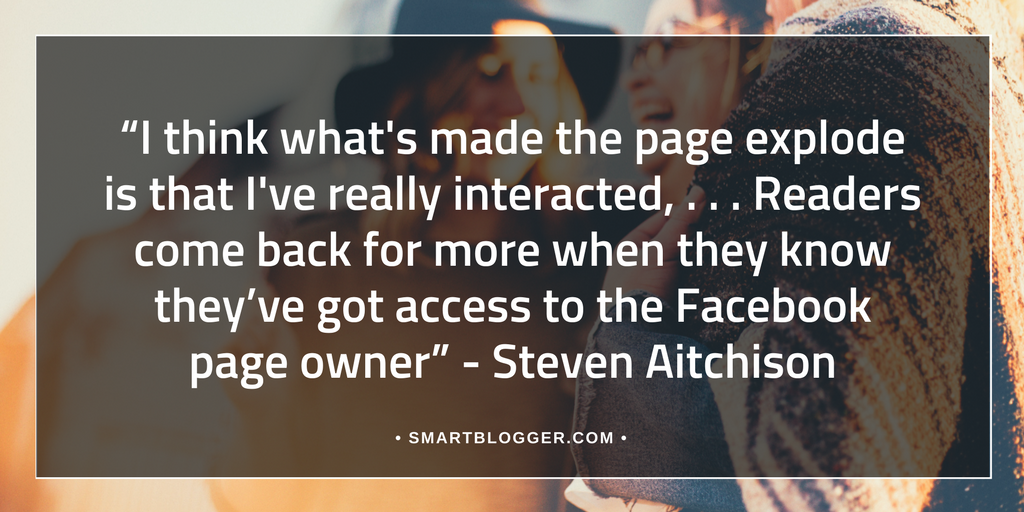

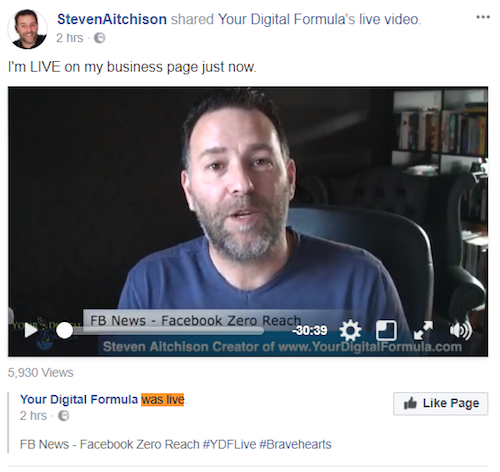
No comments:
Post a Comment